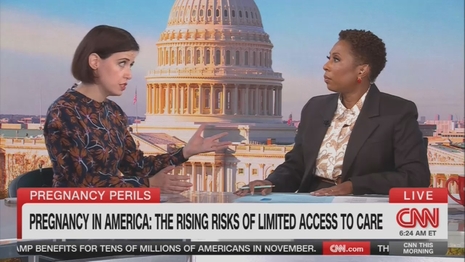 Liberals love to describe themselves as a "voice for the voiceless."
Liberals love to describe themselves as a "voice for the voiceless."
But to abortion rights activist Irin Carmon, the voicelessness of the unborn should strip them of any right to be protected.
Carmon, a CNN commentator and author of the Ruth Bader Ginsburg hagiography, Notorious RBG, spoke with CNN This Morning host Audie Cornish today regarding her pro-abortion rights book, Unbearable: Five Women and the Perils of Pregnancy in America.
Cornish was generally supportive of Carmon and her views. Thus, she spoke of the risks of being pregnant in America, in the sense of the negative impact of pro-life laws. Cornish said nothing about the risks to unborn children in states with liberal abortion laws.
Note also the chyron CNN chose for the segment, "Pregnancy in America: The Rising Risks Of Limited Access To Care." A pro-life alternative might have been: "Dobbs Decision Reduces The Risks For Unborn Children In America."
At one point, Cornish did describe a pro-life position:
"Their argument is that both the unborn child and the person giving birth are equal. People that need to be protected. Right?"
Responded Carmon:
"In practice, it's very hard to make a 50/50 decision between one person who is able to actually speak to you, and one who is a potential person in practice. It does mean that the person ends up getting treated like a vessel."
So, per Carmon, because the unborn can't speak, rather than needing to be protected on an equal basis with the pregnant woman, they are entitled to . . . no protection at all. In Carmon's view, if you protect the life of unborn children, that transforms the mother into a mere "vessel." By that logic, if the mother is a vessel, the unborn are detritus who can be thrown overboard at any point, for any reason.
The segment's opening reflected a classic liberal tactic: find a heart-wrenching story to help make the case. Adriana Smith was a Georgia woman who, when nine weeks pregnant, developed blood clots on the brain, soon became brain dead, and was put of life support. Her doctors believed that it could be a violation of Georgia's pro-life law to disconnect the life support, since doing so would result in the death of Smith's baby. They thus kept her on life support until it was possible to deliver the baby via Caesarean section.
The segment opened with a clip of Adriana's mother, April Newkirk, saying "I shouldn't be burying my daughter. My daughter should bury me." A tragic circumstance, but one unrelated to the decision to keep her daughter on life support until the baby could be delivered.
It's also noteworthy that Newkirk named the baby Chance because, as she explained, "I feel like he had a second chance at life." That's a chance he wouldn't have had if Adriana had immediately been taken off life support.
The feminists were furious. One tweeted: “I might be a monster for saying this, but I don’t want that child to live. Because if it grows to live and have a decent life, then we as women are doomed to never escape the role of an incubator.”
Note: At one point, Carmon the Abortion Champion made the bizarre, macabre claim that the Dobbs decision "is kind of shining a black light on the stain of American history and policy." What?
Here's the transcript.
CNN This Morning
10/31/25
6:21 am EDTAPRIL NEWKIRK: I shouldn't be burying my daughter. My daughter, should bury me. She had a lot, she had a lot to give.
AUDIE CORNISH: You know, it was a story that shocked the country. Adriana Smith, a pregnant woman in Georgia, was on life support after a catastrophic stroke in February left her brain dead. Now, doctors said they could not intervene because of the state's abortion restrictions. Despite the family's wishes, Smith was kept alive until doctors delivered her son Chance prematurely by C-section in June. According to the family's GoFundMe page, Chance is now eight pounds and is still in the NICU because his lungs are underdeveloped.
Now, stories like these show how difficult it is to be pregnant in America with those risks, especially when things can go wrong. And that's what Irin Carmon writes about in her book. It's a new book called "Unbearable, Five Women and the Perils of Pregnancy in America."
. . .
IRIN CARMON: I think what Dobbs has done, it has clarified and it has accelerated, that in many cases in the United States, when you become pregnant, you lose many of your constitutional rights, your medical rights, and your personal rights.
. . .
The question that I started with when I wrote "Unbearable" was, how did we get here, and what is it about Dobbs that is kind of shining a black light on the stain of American history and policy?
. . .
CORNISH: Their argument is that both the unborn child and the person giving birth are equal people that need to be protected, right? Is that usually where these laws are?
CARMON: In practice, it's very hard to make a 50-50 decision between one person who is able to actually speak to you, and one who is a potential person. In practice, it does mean that the person ends up getting treated like a vessel.




